Module 6 Hobbies 课件(共56张PPT) 外研版八年级下册英语
文档属性
| 名称 | Module 6 Hobbies 课件(共56张PPT) 外研版八年级下册英语 |
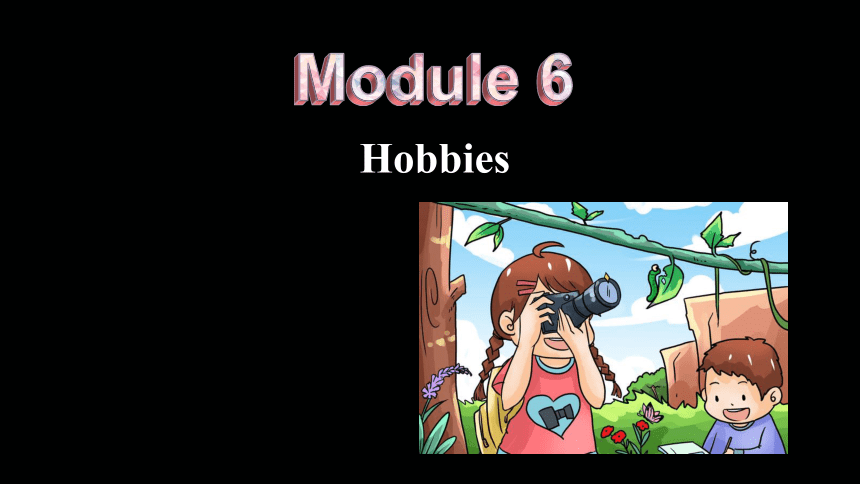
|
|
| 格式 | pptx | ||
| 文件大小 | 5.4MB | ||
| 资源类型 | 教案 | ||
| 版本资源 | 外研版 | ||
| 科目 | 英语 | ||
| 更新时间 | 2023-07-14 00:00:00 | ||
图片预览

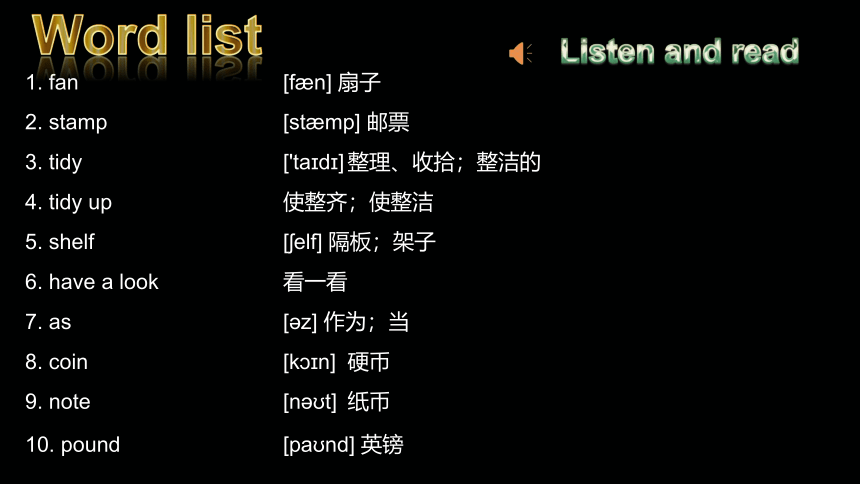
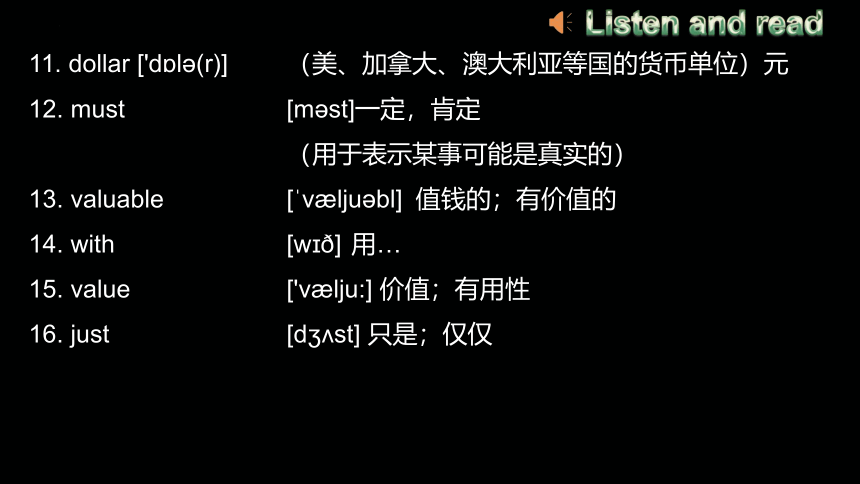
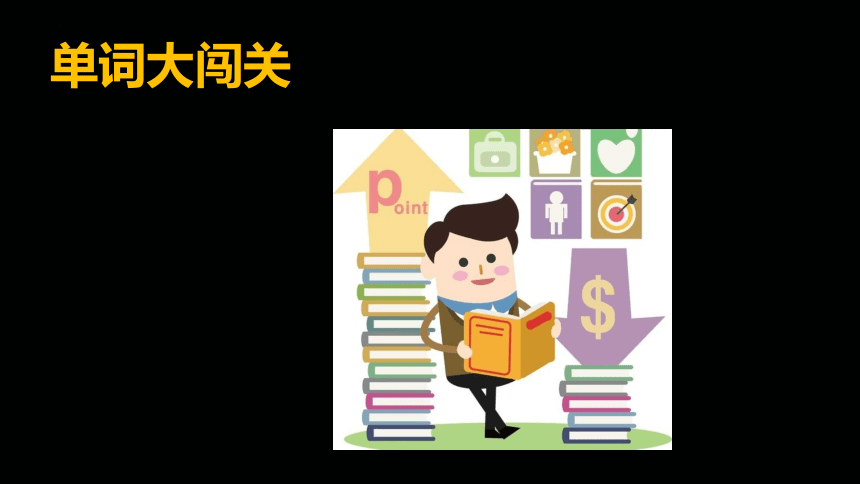
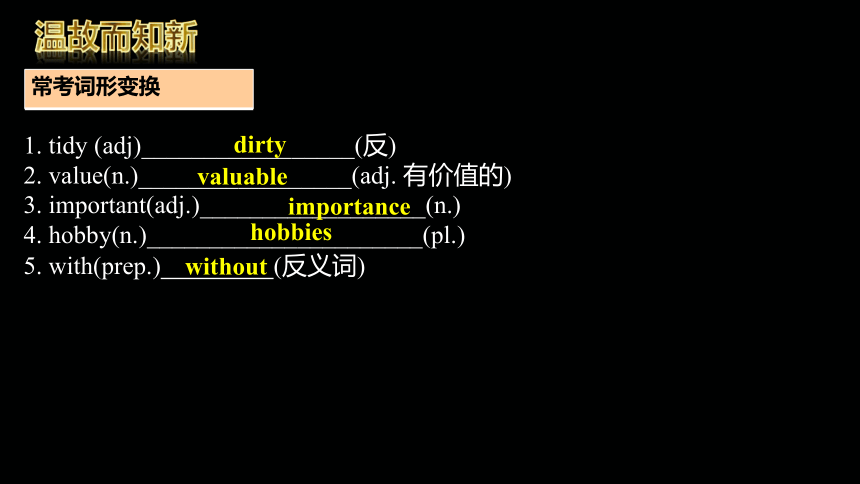
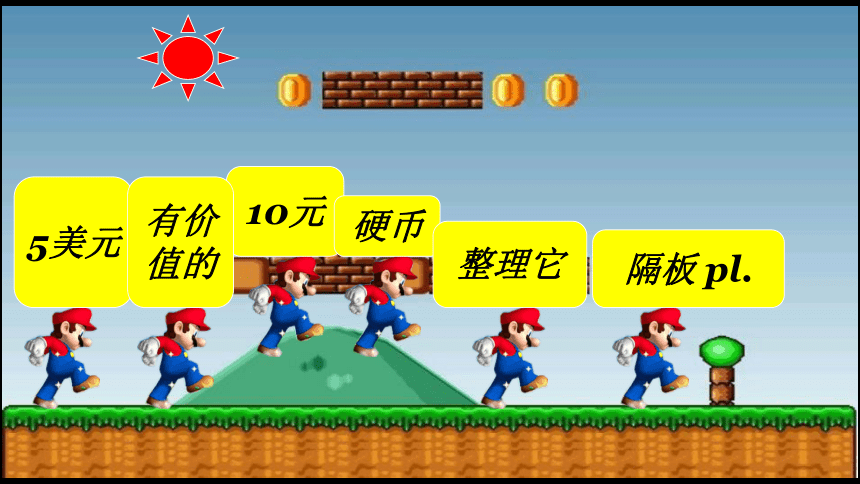
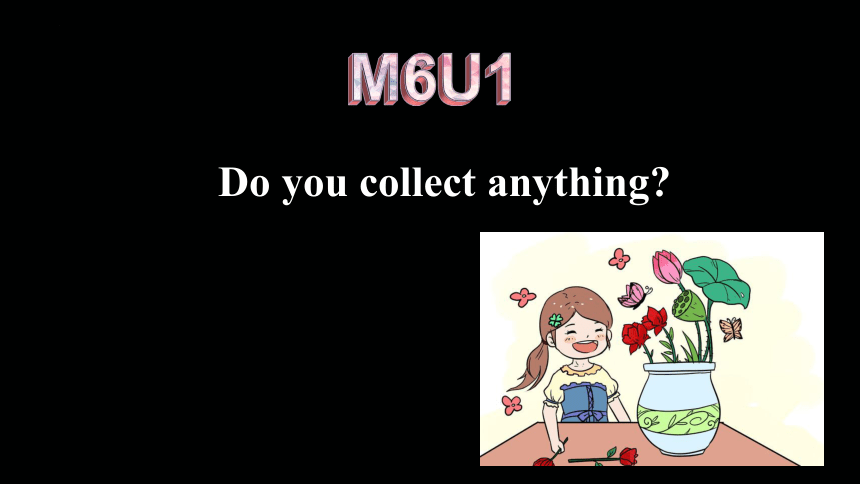

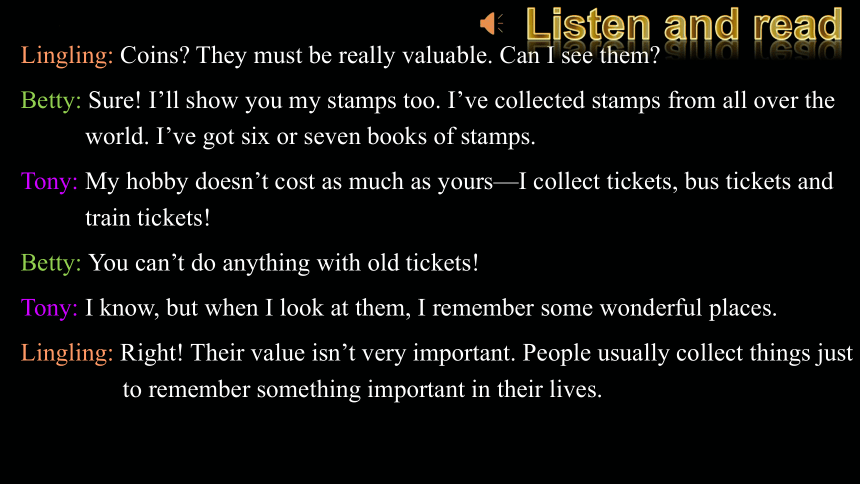

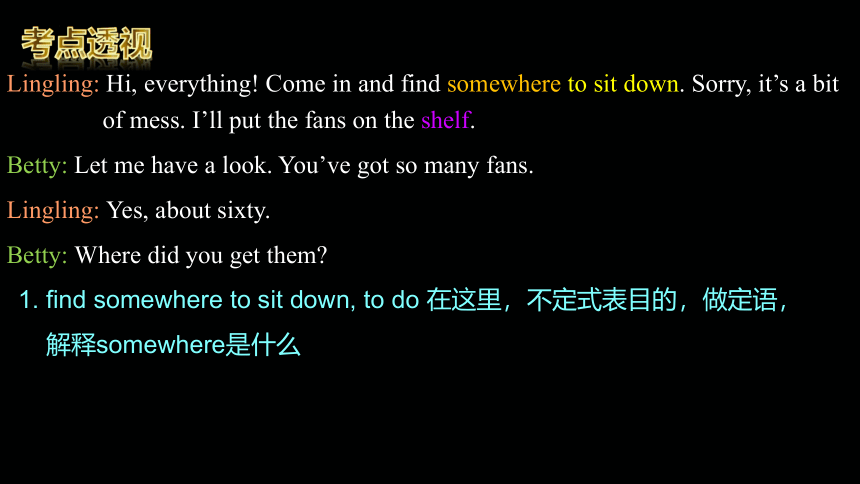
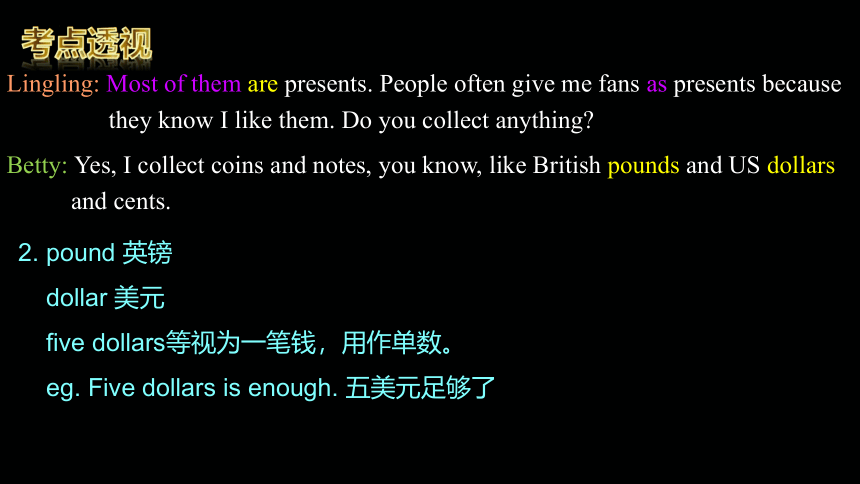
文档简介
(共56张PPT)
Module 6
Hobbies
1. fan [f n] 扇子
2. stamp [st mp] 邮票
3. tidy ['ta d ] 整理、收拾;整洁的
4. tidy up 使整齐;使整洁
5. shelf [ elf] 隔板;架子
6. have a look 看一看
7. as [ z] 作为;当
8. coin [k n] 硬币
9. note [n t] 纸币
10. pound [pa nd] 英镑
Word list
Listen and read
11. dollar ['d l (r)] (美、加拿大、澳大利亚等国的货币单位)元
12. must [m st]一定,肯定
(用于表示某事可能是真实的)
13. valuable [ v lju bl] 值钱的;有价值的
14. with [w ] 用…
15. value ['v lju:] 价值;有用性
16. just [d st] 只是;仅仅
Listen and read
单词大闯关
1. tidy (adj)_________________(反)
2. value(n.)_________________(adj. 有价值的)
3. important(adj.)__________________(n.)
4. hobby(n.)______________________(pl.)
5. with(prep.) (反义词)
常考词形变换
温故而知新
valuable
importance
dirty
hobbies
without
5美元
10元
硬币
隔板 pl.
有价值的
整理它
Do you collect anything
M6U1
Lingling: Hi, everything! Come in and find somewhere to sit down. Sorry, it’s a bit of mess. I’ll put the fans on the shelf.
Betty: Let me have a look. You’ve got so many fans.
Lingling: Yes, about sixty.
Betty: Where did you get them
Lingling: Most of them are presents. People often give me fans as presents because they know I like them. Do you collect anything
Betty: Yes, I collect coins and notes, you know, like British pounds and US dollars.
Listen and read
Lingling: Coins They must be really valuable. Can I see them
Betty: Sure! I’ll show you my stamps too. I’ve collected stamps from all over the world. I’ve got six or seven books of stamps.
Tony: My hobby doesn’t cost as much as yours—I collect tickets, bus tickets and train tickets!
Betty: You can’t do anything with old tickets!
Tony: I know, but when I look at them, I remember some wonderful places.
Lingling: Right! Their value isn’t very important. People usually collect things just to remember something important in their lives.
Listen and read
Read the passage again and answer the following questions.
1.What does Lingling collect
____________________________________________________
2. How can Lingling get the fans?
____________________________________________________
3. What does Betty collect
____________________________________________________
4. Why do people collect things
____________________________________________________
Fans.
People often give her fans as presents.
Coins, notes and stamps.
People usually collect things just to remember something important in their lives.
Lingling: Hi, everything! Come in and find somewhere to sit down. Sorry, it’s a bit of mess. I’ll put the fans on the shelf.
Betty: Let me have a look. You’ve got so many fans.
Lingling: Yes, about sixty.
Betty: Where did you get them
考点透视
1. find somewhere to sit down, to do 在这里,不定式表目的,做定语,
解释somewhere是什么
Lingling: Most of them are presents. People often give me fans as presents because they know I like them. Do you collect anything
Betty: Yes, I collect coins and notes, you know, like British pounds and US dollars and cents.
考点透视
2. pound 英镑
dollar 美元
five dollars等视为一笔钱,用作单数。
eg. Five dollars is enough. 五美元足够了
Lingling: Coins They must be really valuable. Can I see them
Betty: Sure! I’ll show you my stamps too. I’ve collected stamps from all over the world. I’ve got six or seven books of stamps.
考点透视
3. collect stamps 收集邮票,常用复数
Tony: My hobby doesn’t cost as much as yours—I collect tickets, bus tickets and train tickets!
Betty: You can’t do anything with old tickets!
考点透视
4.
人
人
It
物
金钱
时间,金钱
时间
金钱
人+pay(+金钱) for sth.
人+spend+时间/金钱+(in) doing sth.
人+spend+时间/金钱+on sth.
It+takes(+sb.)+时间+to do sth.
物+cost(+sb.)+金钱
5. as+形容词、副词原级+as
as much as 一样多
as far as 一样远
as well as 也,就前原则
Tony: I know, but when I look at them, I remember some wonderful places.
Lingling: Right! Their value isn’t very important. People usually collect
things just to remember something important in their lives.
考点透视
6. remember to do sth. 记得去做某事
remember doing sth. 记得做过某事
7. to remember 不定式表目的,为了...
8. something important 形容词至于不定代词之后
一、根据句意和汉语提示写出所缺的单词。
1.This old table is a (有价值的) piece of furniture.
2.The shirt is too expensive. It (花费) me about three hundred.
3.Many people like collecting (邮票) From it, they learn a lot.
4.Growing vegetables is one of the old man' s (爱好).
5.Tony' mum wants him (整理) up his room.
costs
valuable
hobbies
Unit1随堂检测
stamps
to tidy
II、词形变换。
1.Hi, come in and find somewhere (sit) down.
2.But my (really) hobby is music.
3. (be)200 dollars enough for you to buy the air ticket
4.Thank you for your information. It's very (value).
5.Please help us tidy up these (shelf) in the library.
real
Is
to sit
valuable
Unit1随堂检测
shelves
三、单项选择。
( )1. There is with my computer. It doesn't work now.
A something important B. anything important
C. anything good D. something wrong
( )2. There is much water on the ground.
A. such B. very C. so D. really
( )3. Henry is a good boy. He his bedroom twice a week.
A. tidies up B. takes up C. makes up D. looks up
( )4. ---Do you still remember this group of friend in 2013
---Yes. But I forget where I met them.
A. see B. to see C. saw D. seeing
( )5. I go to my grandparents' home with their housework every Sunday.
A. help B. helped C. to help D. helping
D
A
A
B
C
Unit1随堂检测
三、单项选择。
( )6. This pair of glasses be Tony' s. He's the only one who wears glasses.
A. must B. might C. can't D. can
( )7. He isn’t as as you.Do you agree with me
A. clever B. cleverer C. more clever D. can
( )8. My grandpa knows the history and medical of many plants.
A.wealth B. price C. value D.cost
( )9. What a mess! Your room is really dirty. You must as soon as possible! A.tidy it up B. tidy up it C. tidy them up D.tidy up them
A
A
C
A
Unit1随堂检测
Grammar
简单句
一、基本用法
只有一个主语(或并列主语)和一个谓语(或并列谓语),句子各个成分都是由单词和短语表示,这样的句子称为简单句。
Tom is happy today. 主+系+表+状语
He wrote a story yesterday. 主+谓+宾
I love cartoons. 主+谓+宾
每个句子有且只有一个谓语动词!
一、 句子成分
主语是一个句子的主体,表示所说的是谁或是什么。通常可以充当主语的有 、 、 、 、 、 、
1. Beijing is the capital of China. 北京是中国的首都。
3. Four and five is nine. 4 加 5 等于 9.
2. I work here.我在这里工作。
名词
代词
动名词
数词
不定式
从句
名词
代词
数词
4. To become a teacher is my wish. 成为一名老师是我的心愿。
不定式
5. Getting up early is a good habit.早起是个好习惯。
动名词
6. What we need is time.我们需要的是时间。
从句
2.谓语
谓语用来说明主语的行为、动作或所处的状态。谓语由 充当,一般放在主语的后面。谓语的中心词一般有人称、数和时态的变化。
1. She likes drawing。她喜欢画画。
3. I would like to invite all my friends here.我想把所有的朋友都邀请到这里来
2. I went to America last week.上周我去了美国。
动词
1. He is a teacher. 他是一个老师。
3. She is in the classroom. 她在教室里。
2. This desk is mine. 这张桌子是我的。
3.表语
表语一般用来说明主语的性质、身份、特征和状态,一般放在系动词之后。通常可以充当表语的有:名词、代词、数词、形容词、副词、介词短语、不定式和动名词等。
4. The fish tastes good. 鱼很好吃。
1. I love peace. 她喜欢画画。
2. Please wake me up at six tomorrow morning.明天早上六点钟叫醒我。
3. I need three more.我还需要三个。
4. He enjoys reading.他喜欢阅读。
5. She promised to come.她承诺她会来。
4.宾语
宾语表示动作、行为的对象,和及物动词一起说明主语做什么。宾语可分为单宾语、双宾语(直接宾语和间接宾语)和复合宾语(宾语+补足语)。通常可以做宾语的有名词、代词、数词、动名词、不定式等。
1. We must keep the classroom clean. 我们必须保持教室干净。
2. Leave it on the desk. 把它放在桌子上吧。
5.宾语补足语
宾语补足语用来补充说明宾语,与宾语一起构成复合宾语。可做宾语补足语的有名词、形容词、介词和动词不定式等。
1.主语+谓语动词(S+V)
The new term begins. 新学期开始了。
2.主语+谓语动词+宾语(S+V+O)
Mr.Green studies English. 格林先生研究英语。
3.主语+系动词+表语(S+V+P)
Tony is happy today.托尼今天很高兴。
4.主语+谓语动词+间接宾语+直接宾语(S+V+IO+DO)
My father bought me a book last week. 上周我的爸爸给我买了一本书。
5.主语+谓语动词+宾语+宾语补足语(S+V+O+OC)
The news made everyone happy. 这个消息让每个人都很开心。
二、 基本句型
小结:
一、句子结构题:连词成句,并说明句子属于哪种结构。
A.主语+谓语+状语
B.主语+谓语+宾语+状语
C.主语+系动词+表语+状语
D.主语+谓语+间接宾语+直接宾语+状语
E.主语+谓语+宾语+宾语补足语+状语
F.there + be +主语+状语
1 .The woman is singing now.( )
2.He gave her some apples.( )
3.All her other friends were now outside the door.( )
4.People eat fish and chips on the road.( )
5.I ask them to come tomorrow( )
A
D
C
语法练习
B
E
二、根据汉语提示,完成下列句子,每空一词
1.明天我将给我女儿买块手表。
工will buy tomorrow.
2.看,他们在唱歌和跳舞。
Look, they .
3.这块蛋糕看上去很大。
The cake very .
4.安邀请她的朋友参加她的生日聚会。
Ann asked her friends to her birthday party.
5.我不会让你走。
I won’ t you .
a watch for my daughter
are singing and dancing
语法练习
looks big
to come
let go
三、按下列要求改写句子,每空一词。
1.He gave me some rice.(改为同义句)
He gave .
2." Sit down. " The teacher told me.(合并为一句)
The teacher told me .
3.The fish tastes nice.(就划线部分提问)
the fish taste
4.He would like you to help him.(改为一般疑问句)
he you to help him
5.He cooked me delicious food this morning.(改为同义句)
He cooked delicious food me this morning.
some rice to me
to sit down
语法练习
How does
would like
for
David’s hobbies
M6U2
1. person ['p :sn] 人(通常指成年人)
2. interest [' ntr st] 兴趣;爱好
3. skill [sk l] 技能;技艺
4. activity [ k't v t ] 活动
5. sailing [ se l ] 航海;航行
6. come out 出版;问世
7. result [r 'z lt] 结果;后果
8. as a result 结果;因此
9. pleasure ['ple (r)] 愉悦;快乐
10. success [s k'ses] 成功;成就
Listen and read
单词大闯关
1.succeed (v.) (adj.) (n.) (adv.)
2.interest (v.) (adj.) (adj.) (n.)
3.please(v.) (adj.) (adj.) (n.)
4. activity(n.) (pl.)
5. person(n.) (adj.)
常考词形变换
温故而知新
activities
personal
interesting interested interest
successful success successfully
pleasant pleased pleasure
对...感兴趣
出版,问世
个人的
成功的adj.
去航海
结果;因此
David’s hobbies
Many students have hobbies, such as reading, painting, growing vegetables and looking after animals. Some hobbies are relaxing and others are active. Hobbies can make you grow as a person, develop your interests and help you learn new skills.
David Smith is a student, and one of his hobbies is writing. During the summer of 2010, he spent four weeks at a summer camp. As well as the usual activities, such as sailing and climbing, there was a writing class. “The teacher is a writer, and she asked us to talk about our lives and tell interesting stories. Then she encouraged us to write about our experiences at the camp.”
Passage
Back at school, David wrote a story about the life of a sixteen–year–old boy, and it came out as a book in 2012. Many young people love his book, and as a result, David has become a successful young writer.
David has been very lucky because his hobby has brought him pleasure and success, but writing is not his only hobby. “I like playing volleyball too,” says David. “I spend some of my free time playing volleyball for my school team. Maybe I’ll write about my volleyball team in my future books.”
Read the passage again and answer the following questions.
1.Why do people usually have hobbies
.
.
2. Is writing a usual activity for a summer camp
____________________________________________________
3. When did David become a successful writer
____________________________________________________
4. How many hobbies does David have
____________________________________________________
Some hobbies are relaxing and others are active. Hobbies can make you grow as a person, develop your interests and help you learn new skills.
Yes, it is.
2012
Two.
Many students have hobbies, such as reading, painting, growing vegetables and looking after animals. Some hobbies are relaxing and others are active. Hobbies can make you grow as a person, develop your interests and help you learn new skills.
考点透视
1. such as+词, 后面不加逗号,举例两个或两个以上的食物
for example+句子, 后面要加逗号,举例一个例子
2. 1) make sb do sth. 使得某人做某事 2)make sb + adj 使某人...
help sb do sth. 帮助某人做某事
同样接省略to的不定式有:let, had better
David Smith is a student, and one of his hobbies is writing. During the summer of 2010, he spent four weeks at a summer camp. As well as the usual activities, such as sailing and climbing, there was a writing class. “The teacher is a writer, and she asked us to talk about our lives and tell interesting stories. Then she encouraged us to write about our experiences at the camp.”
考点透视
3. ask sb. to do sth. 要求某人做某事
4. encourage sb. to do sth. 鼓励某人做某事
5. experience n. 经历, 可数
n. 经验,不可数
Back at school, David wrote a story about the life of a sixteen–year–old boy, and it came out as a book in 2012. Many young people love his book, and as a result, David has become a successful young writer.
考点透视
6. come out 出版;开花;出现
When is her new novel coming out 她的新小说何时出版
The flowers came out.花开了。
The moon comes out at night.月亮在晚上出来。
David has been very lucky because his hobby has brought him pleasure and success, but writing is not his only hobby. “I like playing volleyball too,” says David. “I spend some of my free time playing volleyball for my school team. Maybe I’ll write about my volleyball team in my future books.”
考点透视
7. (1)pleasure。不可数名词,意为“愉悦,
Reading gives me great pleasure. 读书给我极大的快乐。
(2)辨析: pleasure,pleasant与pleased
巧记:
pleasure n.
pleasant adj. 修饰物,名词前
pleaed adj. 修饰人,be动词后
I、单词拼写。
1.Do your parents take an (兴趣) in your friends
2.It' s a (愉悦) for me to stay with you.
3.Everybody will be lucky or (成功的) sometime in their life.
4.He is a very nice (人) to work with.
5. Jessica' s parents always (鼓励) her to speak out her
opinions.
pleasure
successful
interest
Unit2随堂检测
person
encourage
II、词形变换。
1.Hobbies can make you (grow)as a person, develop your interests and help you learn new skills.
2.Luckily, David's hobbies has brought him success and (please).
3.He wants to be a (success) writer like William Shakespeare.
4.They have decided to go (sail) together.
5.There' re a lot of (activity) in our football club.
pleasure
sailing
grow
activities
Unit2随堂检测
successful
三、单项选择。
( )1. You shouldn't spend much time computer games.
A. in B. on C. to D. of
( )2. I like playing violin, but Tom likes playing basketball.
A. the ; / B. the; the C. / ; the D. / ;/
( )3. Our English teacher encourages us English as possible as we can.
A. speak B. to speak C. speaking D. spoke
( )4. The man didn't give up his dream and kept working hard. , he
became a well-known singer.
A. As for B. As a result C. Such as D. For example
( )5. The singer' s first song in 2015, and then he became popular at once.
A. come out B. come over C. come up D. come on
B
A
B
B
A
Unit2随堂检测
三、单项选择。
( )6. They came to China to learn Chinese its culture.
A. as much as B. as many as
C. as far as D. as well as
( )7. It is not interesting such a boring movie tonight.
A. watching B. to watch C. watches D. watch
( )8. Don’t make Jack so much housework.He is not old enough to do this.
A. do B. does C. to do D. did
( )9. —So kind of you to give me a ride to the bus stop.
— .
A. My pleasure. B. Never mind.
C. It doesn’t matter. D. That’s nothing to do.
( )10. A better future is the dream of the Chinese people, and it’s also the common of
the world.
A. interested B. interest C. interesting D. did
D
B
A
A
B
Unit2随堂检测
Writing
目前越来越多的中学生参加了自己喜爱的兴趣小组,如书法(calligraphy)、手工(arts and crafts)、乐队(band)等等,请以“My hobby”为题. 谈谈你的课余爱好。要点如下:
1.你有什么兴趣爱好:
2.喜欢的理由;
3.这个爱好带给你怎样的收获:
4.对同学们在选择课余爱好上有怎样的建议。
提示词语:group, be interested in, important
写作实例1
1. 定人称,定时态
时态
人称
A
本文是以“My hobbies”为题,介绍自己的爱好,所采用的人称应以 为主。
B
以 为主。
第一人称
一般现在时
和一般过去时
2. 写作导图
1.不同的人有不同的爱好,我的爱好是xxx
.
.
2. 我是在xxx岁时开始喜欢做xxx的.
.
.
参考句式
Different people have different hobbies, my hobby is xxx
I started do xxx when I was xxx years old.
3. xxx使我愉悦给我带来成功。
.
4.好的爱好可以使你成为一个更好的人,拓展你的兴趣,
并且帮助你学习新技能。
.
参考句式
xxx has brought my pleasure and success
Good hobbies can make you grow as a person, develop your interests and help you learn new skills.
My hobbies
Different people have different hobbies. My hobby is collecting coins.
I got my first coin on my 8th birthday from my grandpa. It wasan old Chinese coin. I like it very much. I have collected coins for 7 years, and I have more than 2, 500 coins from different countries irdifferent shapes. I keep them in the box under the bed. Collectingcoins helps me learn a lot about different culture and history. Lastyear,I donated some of my coins to homeless children. I really think it is worth doing.
Collecting coins is not my only hobbies, I like listening to music too. Good hobbies can make you grow as a person, develop your interests and help you learn new skills. This is my hobby.What is yours
范文示例
Module 6的课后
作业
1
读M6的课文并发语音打卡接龙
2
Homework
Module 6
Hobbies
1. fan [f n] 扇子
2. stamp [st mp] 邮票
3. tidy ['ta d ] 整理、收拾;整洁的
4. tidy up 使整齐;使整洁
5. shelf [ elf] 隔板;架子
6. have a look 看一看
7. as [ z] 作为;当
8. coin [k n] 硬币
9. note [n t] 纸币
10. pound [pa nd] 英镑
Word list
Listen and read
11. dollar ['d l (r)] (美、加拿大、澳大利亚等国的货币单位)元
12. must [m st]一定,肯定
(用于表示某事可能是真实的)
13. valuable [ v lju bl] 值钱的;有价值的
14. with [w ] 用…
15. value ['v lju:] 价值;有用性
16. just [d st] 只是;仅仅
Listen and read
单词大闯关
1. tidy (adj)_________________(反)
2. value(n.)_________________(adj. 有价值的)
3. important(adj.)__________________(n.)
4. hobby(n.)______________________(pl.)
5. with(prep.) (反义词)
常考词形变换
温故而知新
valuable
importance
dirty
hobbies
without
5美元
10元
硬币
隔板 pl.
有价值的
整理它
Do you collect anything
M6U1
Lingling: Hi, everything! Come in and find somewhere to sit down. Sorry, it’s a bit of mess. I’ll put the fans on the shelf.
Betty: Let me have a look. You’ve got so many fans.
Lingling: Yes, about sixty.
Betty: Where did you get them
Lingling: Most of them are presents. People often give me fans as presents because they know I like them. Do you collect anything
Betty: Yes, I collect coins and notes, you know, like British pounds and US dollars.
Listen and read
Lingling: Coins They must be really valuable. Can I see them
Betty: Sure! I’ll show you my stamps too. I’ve collected stamps from all over the world. I’ve got six or seven books of stamps.
Tony: My hobby doesn’t cost as much as yours—I collect tickets, bus tickets and train tickets!
Betty: You can’t do anything with old tickets!
Tony: I know, but when I look at them, I remember some wonderful places.
Lingling: Right! Their value isn’t very important. People usually collect things just to remember something important in their lives.
Listen and read
Read the passage again and answer the following questions.
1.What does Lingling collect
____________________________________________________
2. How can Lingling get the fans?
____________________________________________________
3. What does Betty collect
____________________________________________________
4. Why do people collect things
____________________________________________________
Fans.
People often give her fans as presents.
Coins, notes and stamps.
People usually collect things just to remember something important in their lives.
Lingling: Hi, everything! Come in and find somewhere to sit down. Sorry, it’s a bit of mess. I’ll put the fans on the shelf.
Betty: Let me have a look. You’ve got so many fans.
Lingling: Yes, about sixty.
Betty: Where did you get them
考点透视
1. find somewhere to sit down, to do 在这里,不定式表目的,做定语,
解释somewhere是什么
Lingling: Most of them are presents. People often give me fans as presents because they know I like them. Do you collect anything
Betty: Yes, I collect coins and notes, you know, like British pounds and US dollars and cents.
考点透视
2. pound 英镑
dollar 美元
five dollars等视为一笔钱,用作单数。
eg. Five dollars is enough. 五美元足够了
Lingling: Coins They must be really valuable. Can I see them
Betty: Sure! I’ll show you my stamps too. I’ve collected stamps from all over the world. I’ve got six or seven books of stamps.
考点透视
3. collect stamps 收集邮票,常用复数
Tony: My hobby doesn’t cost as much as yours—I collect tickets, bus tickets and train tickets!
Betty: You can’t do anything with old tickets!
考点透视
4.
人
人
It
物
金钱
时间,金钱
时间
金钱
人+pay(+金钱) for sth.
人+spend+时间/金钱+(in) doing sth.
人+spend+时间/金钱+on sth.
It+takes(+sb.)+时间+to do sth.
物+cost(+sb.)+金钱
5. as+形容词、副词原级+as
as much as 一样多
as far as 一样远
as well as 也,就前原则
Tony: I know, but when I look at them, I remember some wonderful places.
Lingling: Right! Their value isn’t very important. People usually collect
things just to remember something important in their lives.
考点透视
6. remember to do sth. 记得去做某事
remember doing sth. 记得做过某事
7. to remember 不定式表目的,为了...
8. something important 形容词至于不定代词之后
一、根据句意和汉语提示写出所缺的单词。
1.This old table is a (有价值的) piece of furniture.
2.The shirt is too expensive. It (花费) me about three hundred.
3.Many people like collecting (邮票) From it, they learn a lot.
4.Growing vegetables is one of the old man' s (爱好).
5.Tony' mum wants him (整理) up his room.
costs
valuable
hobbies
Unit1随堂检测
stamps
to tidy
II、词形变换。
1.Hi, come in and find somewhere (sit) down.
2.But my (really) hobby is music.
3. (be)200 dollars enough for you to buy the air ticket
4.Thank you for your information. It's very (value).
5.Please help us tidy up these (shelf) in the library.
real
Is
to sit
valuable
Unit1随堂检测
shelves
三、单项选择。
( )1. There is with my computer. It doesn't work now.
A something important B. anything important
C. anything good D. something wrong
( )2. There is much water on the ground.
A. such B. very C. so D. really
( )3. Henry is a good boy. He his bedroom twice a week.
A. tidies up B. takes up C. makes up D. looks up
( )4. ---Do you still remember this group of friend in 2013
---Yes. But I forget where I met them.
A. see B. to see C. saw D. seeing
( )5. I go to my grandparents' home with their housework every Sunday.
A. help B. helped C. to help D. helping
D
A
A
B
C
Unit1随堂检测
三、单项选择。
( )6. This pair of glasses be Tony' s. He's the only one who wears glasses.
A. must B. might C. can't D. can
( )7. He isn’t as as you.Do you agree with me
A. clever B. cleverer C. more clever D. can
( )8. My grandpa knows the history and medical of many plants.
A.wealth B. price C. value D.cost
( )9. What a mess! Your room is really dirty. You must as soon as possible! A.tidy it up B. tidy up it C. tidy them up D.tidy up them
A
A
C
A
Unit1随堂检测
Grammar
简单句
一、基本用法
只有一个主语(或并列主语)和一个谓语(或并列谓语),句子各个成分都是由单词和短语表示,这样的句子称为简单句。
Tom is happy today. 主+系+表+状语
He wrote a story yesterday. 主+谓+宾
I love cartoons. 主+谓+宾
每个句子有且只有一个谓语动词!
一、 句子成分
主语是一个句子的主体,表示所说的是谁或是什么。通常可以充当主语的有 、 、 、 、 、 、
1. Beijing is the capital of China. 北京是中国的首都。
3. Four and five is nine. 4 加 5 等于 9.
2. I work here.我在这里工作。
名词
代词
动名词
数词
不定式
从句
名词
代词
数词
4. To become a teacher is my wish. 成为一名老师是我的心愿。
不定式
5. Getting up early is a good habit.早起是个好习惯。
动名词
6. What we need is time.我们需要的是时间。
从句
2.谓语
谓语用来说明主语的行为、动作或所处的状态。谓语由 充当,一般放在主语的后面。谓语的中心词一般有人称、数和时态的变化。
1. She likes drawing。她喜欢画画。
3. I would like to invite all my friends here.我想把所有的朋友都邀请到这里来
2. I went to America last week.上周我去了美国。
动词
1. He is a teacher. 他是一个老师。
3. She is in the classroom. 她在教室里。
2. This desk is mine. 这张桌子是我的。
3.表语
表语一般用来说明主语的性质、身份、特征和状态,一般放在系动词之后。通常可以充当表语的有:名词、代词、数词、形容词、副词、介词短语、不定式和动名词等。
4. The fish tastes good. 鱼很好吃。
1. I love peace. 她喜欢画画。
2. Please wake me up at six tomorrow morning.明天早上六点钟叫醒我。
3. I need three more.我还需要三个。
4. He enjoys reading.他喜欢阅读。
5. She promised to come.她承诺她会来。
4.宾语
宾语表示动作、行为的对象,和及物动词一起说明主语做什么。宾语可分为单宾语、双宾语(直接宾语和间接宾语)和复合宾语(宾语+补足语)。通常可以做宾语的有名词、代词、数词、动名词、不定式等。
1. We must keep the classroom clean. 我们必须保持教室干净。
2. Leave it on the desk. 把它放在桌子上吧。
5.宾语补足语
宾语补足语用来补充说明宾语,与宾语一起构成复合宾语。可做宾语补足语的有名词、形容词、介词和动词不定式等。
1.主语+谓语动词(S+V)
The new term begins. 新学期开始了。
2.主语+谓语动词+宾语(S+V+O)
Mr.Green studies English. 格林先生研究英语。
3.主语+系动词+表语(S+V+P)
Tony is happy today.托尼今天很高兴。
4.主语+谓语动词+间接宾语+直接宾语(S+V+IO+DO)
My father bought me a book last week. 上周我的爸爸给我买了一本书。
5.主语+谓语动词+宾语+宾语补足语(S+V+O+OC)
The news made everyone happy. 这个消息让每个人都很开心。
二、 基本句型
小结:
一、句子结构题:连词成句,并说明句子属于哪种结构。
A.主语+谓语+状语
B.主语+谓语+宾语+状语
C.主语+系动词+表语+状语
D.主语+谓语+间接宾语+直接宾语+状语
E.主语+谓语+宾语+宾语补足语+状语
F.there + be +主语+状语
1 .The woman is singing now.( )
2.He gave her some apples.( )
3.All her other friends were now outside the door.( )
4.People eat fish and chips on the road.( )
5.I ask them to come tomorrow( )
A
D
C
语法练习
B
E
二、根据汉语提示,完成下列句子,每空一词
1.明天我将给我女儿买块手表。
工will buy tomorrow.
2.看,他们在唱歌和跳舞。
Look, they .
3.这块蛋糕看上去很大。
The cake very .
4.安邀请她的朋友参加她的生日聚会。
Ann asked her friends to her birthday party.
5.我不会让你走。
I won’ t you .
a watch for my daughter
are singing and dancing
语法练习
looks big
to come
let go
三、按下列要求改写句子,每空一词。
1.He gave me some rice.(改为同义句)
He gave .
2." Sit down. " The teacher told me.(合并为一句)
The teacher told me .
3.The fish tastes nice.(就划线部分提问)
the fish taste
4.He would like you to help him.(改为一般疑问句)
he you to help him
5.He cooked me delicious food this morning.(改为同义句)
He cooked delicious food me this morning.
some rice to me
to sit down
语法练习
How does
would like
for
David’s hobbies
M6U2
1. person ['p :sn] 人(通常指成年人)
2. interest [' ntr st] 兴趣;爱好
3. skill [sk l] 技能;技艺
4. activity [ k't v t ] 活动
5. sailing [ se l ] 航海;航行
6. come out 出版;问世
7. result [r 'z lt] 结果;后果
8. as a result 结果;因此
9. pleasure ['ple (r)] 愉悦;快乐
10. success [s k'ses] 成功;成就
Listen and read
单词大闯关
1.succeed (v.) (adj.) (n.) (adv.)
2.interest (v.) (adj.) (adj.) (n.)
3.please(v.) (adj.) (adj.) (n.)
4. activity(n.) (pl.)
5. person(n.) (adj.)
常考词形变换
温故而知新
activities
personal
interesting interested interest
successful success successfully
pleasant pleased pleasure
对...感兴趣
出版,问世
个人的
成功的adj.
去航海
结果;因此
David’s hobbies
Many students have hobbies, such as reading, painting, growing vegetables and looking after animals. Some hobbies are relaxing and others are active. Hobbies can make you grow as a person, develop your interests and help you learn new skills.
David Smith is a student, and one of his hobbies is writing. During the summer of 2010, he spent four weeks at a summer camp. As well as the usual activities, such as sailing and climbing, there was a writing class. “The teacher is a writer, and she asked us to talk about our lives and tell interesting stories. Then she encouraged us to write about our experiences at the camp.”
Passage
Back at school, David wrote a story about the life of a sixteen–year–old boy, and it came out as a book in 2012. Many young people love his book, and as a result, David has become a successful young writer.
David has been very lucky because his hobby has brought him pleasure and success, but writing is not his only hobby. “I like playing volleyball too,” says David. “I spend some of my free time playing volleyball for my school team. Maybe I’ll write about my volleyball team in my future books.”
Read the passage again and answer the following questions.
1.Why do people usually have hobbies
.
.
2. Is writing a usual activity for a summer camp
____________________________________________________
3. When did David become a successful writer
____________________________________________________
4. How many hobbies does David have
____________________________________________________
Some hobbies are relaxing and others are active. Hobbies can make you grow as a person, develop your interests and help you learn new skills.
Yes, it is.
2012
Two.
Many students have hobbies, such as reading, painting, growing vegetables and looking after animals. Some hobbies are relaxing and others are active. Hobbies can make you grow as a person, develop your interests and help you learn new skills.
考点透视
1. such as+词, 后面不加逗号,举例两个或两个以上的食物
for example+句子, 后面要加逗号,举例一个例子
2. 1) make sb do sth. 使得某人做某事 2)make sb + adj 使某人...
help sb do sth. 帮助某人做某事
同样接省略to的不定式有:let, had better
David Smith is a student, and one of his hobbies is writing. During the summer of 2010, he spent four weeks at a summer camp. As well as the usual activities, such as sailing and climbing, there was a writing class. “The teacher is a writer, and she asked us to talk about our lives and tell interesting stories. Then she encouraged us to write about our experiences at the camp.”
考点透视
3. ask sb. to do sth. 要求某人做某事
4. encourage sb. to do sth. 鼓励某人做某事
5. experience n. 经历, 可数
n. 经验,不可数
Back at school, David wrote a story about the life of a sixteen–year–old boy, and it came out as a book in 2012. Many young people love his book, and as a result, David has become a successful young writer.
考点透视
6. come out 出版;开花;出现
When is her new novel coming out 她的新小说何时出版
The flowers came out.花开了。
The moon comes out at night.月亮在晚上出来。
David has been very lucky because his hobby has brought him pleasure and success, but writing is not his only hobby. “I like playing volleyball too,” says David. “I spend some of my free time playing volleyball for my school team. Maybe I’ll write about my volleyball team in my future books.”
考点透视
7. (1)pleasure。不可数名词,意为“愉悦,
Reading gives me great pleasure. 读书给我极大的快乐。
(2)辨析: pleasure,pleasant与pleased
巧记:
pleasure n.
pleasant adj. 修饰物,名词前
pleaed adj. 修饰人,be动词后
I、单词拼写。
1.Do your parents take an (兴趣) in your friends
2.It' s a (愉悦) for me to stay with you.
3.Everybody will be lucky or (成功的) sometime in their life.
4.He is a very nice (人) to work with.
5. Jessica' s parents always (鼓励) her to speak out her
opinions.
pleasure
successful
interest
Unit2随堂检测
person
encourage
II、词形变换。
1.Hobbies can make you (grow)as a person, develop your interests and help you learn new skills.
2.Luckily, David's hobbies has brought him success and (please).
3.He wants to be a (success) writer like William Shakespeare.
4.They have decided to go (sail) together.
5.There' re a lot of (activity) in our football club.
pleasure
sailing
grow
activities
Unit2随堂检测
successful
三、单项选择。
( )1. You shouldn't spend much time computer games.
A. in B. on C. to D. of
( )2. I like playing violin, but Tom likes playing basketball.
A. the ; / B. the; the C. / ; the D. / ;/
( )3. Our English teacher encourages us English as possible as we can.
A. speak B. to speak C. speaking D. spoke
( )4. The man didn't give up his dream and kept working hard. , he
became a well-known singer.
A. As for B. As a result C. Such as D. For example
( )5. The singer' s first song in 2015, and then he became popular at once.
A. come out B. come over C. come up D. come on
B
A
B
B
A
Unit2随堂检测
三、单项选择。
( )6. They came to China to learn Chinese its culture.
A. as much as B. as many as
C. as far as D. as well as
( )7. It is not interesting such a boring movie tonight.
A. watching B. to watch C. watches D. watch
( )8. Don’t make Jack so much housework.He is not old enough to do this.
A. do B. does C. to do D. did
( )9. —So kind of you to give me a ride to the bus stop.
— .
A. My pleasure. B. Never mind.
C. It doesn’t matter. D. That’s nothing to do.
( )10. A better future is the dream of the Chinese people, and it’s also the common of
the world.
A. interested B. interest C. interesting D. did
D
B
A
A
B
Unit2随堂检测
Writing
目前越来越多的中学生参加了自己喜爱的兴趣小组,如书法(calligraphy)、手工(arts and crafts)、乐队(band)等等,请以“My hobby”为题. 谈谈你的课余爱好。要点如下:
1.你有什么兴趣爱好:
2.喜欢的理由;
3.这个爱好带给你怎样的收获:
4.对同学们在选择课余爱好上有怎样的建议。
提示词语:group, be interested in, important
写作实例1
1. 定人称,定时态
时态
人称
A
本文是以“My hobbies”为题,介绍自己的爱好,所采用的人称应以 为主。
B
以 为主。
第一人称
一般现在时
和一般过去时
2. 写作导图
1.不同的人有不同的爱好,我的爱好是xxx
.
.
2. 我是在xxx岁时开始喜欢做xxx的.
.
.
参考句式
Different people have different hobbies, my hobby is xxx
I started do xxx when I was xxx years old.
3. xxx使我愉悦给我带来成功。
.
4.好的爱好可以使你成为一个更好的人,拓展你的兴趣,
并且帮助你学习新技能。
.
参考句式
xxx has brought my pleasure and success
Good hobbies can make you grow as a person, develop your interests and help you learn new skills.
My hobbies
Different people have different hobbies. My hobby is collecting coins.
I got my first coin on my 8th birthday from my grandpa. It wasan old Chinese coin. I like it very much. I have collected coins for 7 years, and I have more than 2, 500 coins from different countries irdifferent shapes. I keep them in the box under the bed. Collectingcoins helps me learn a lot about different culture and history. Lastyear,I donated some of my coins to homeless children. I really think it is worth doing.
Collecting coins is not my only hobbies, I like listening to music too. Good hobbies can make you grow as a person, develop your interests and help you learn new skills. This is my hobby.What is yours
范文示例
Module 6的课后
作业
1
读M6的课文并发语音打卡接龙
2
Homework
同课章节目录
- Module 1 Feelings and impressions
- Unit 1 It smells delicious.
- Unit 2 I feel nervous when I speak Chinese .
- Unit 3 Language in use
- Module 2 Experiences
- Unit 1 I've also entered lots of speaking competi
- Unit 2 They have seen the Pyramids.
- Unit 3 Language in use
- Module 3 Journey to space
- Unit 1 Has it arrived yet?
- Unit 2 We have not found life on any other planet
- Unit 3 Language in use
- Module 4 Seeing the docto
- Unit 1 I haven't done much exercise since I got m
- Unit 2 We have played football for a year now
- Unit 3 Language in use
- Module 5 Cartoons
- Unit 1 It's time to watch a cartoon.
- Unit 2 Tintin has been popular for over eighty yea
- Unit 3 Language in use
- Revision module A
- Module 6 Hobbies
- Unit 1 Do you collect anything ?
- Unit 2 Hobbies can make you grow as a person.
- Unit 3 Language in use
- Module 7 Summer in Los Angeles
- Unit 1 Please write to me and send me some photos
- Unit 2 Fill out a form and come to learn English
- Unit 3 Language in use
- Module 8 Time off
- Unit 1 I can hardly believe we are in the city ce
- Unit 2 We thought somebody was moving about
- Unit 3 Language in use
- Module 9 Friendship
- Unit 1 Could I ask if you've mentioned this to he
- Unit 2 I believe that the world is what you think
- Unit 3 Language in use
- Module 10 On the radio
- Unit 1 I hope that you can join us one day
- Unit 2 It seemed that they were speaking to me in
- Unit 3 Language in use
- Revision module B
